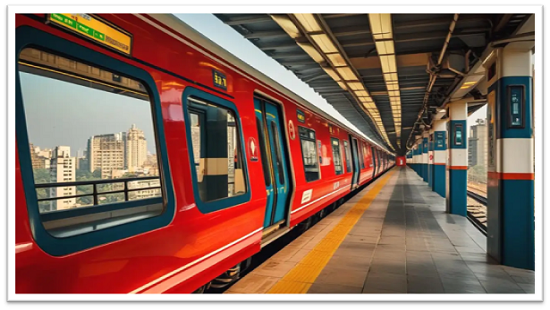
Big Boost for Mumbai Commuters: ESIC Metro Station to Be Renamed ‘Hare Ram Hare Krishna’ as Metro Lines 6 & 7 Get Clear Timelines
Infrastructure decisions often mirror the cultural and civic mood of a region, and Mumbai’s recent development is no exception. In a significant administrative update for residents of the Mumbai North West Lok Sabha constituency, the ESIC Metro Station is set to be renamed as Hare Ram Hare Krishna Metro Station. The proposal emerged from a discussion between MP Ravindra Waikar and MMRDA Commissioner Sanjay Mukherjee and is now awaiting the final approval of Deputy Chief Minister and Urban Development Minister Eknath Shinde.
The renaming initiative was originally proposed by MP Waikar during his meeting with Deputy CM Shinde, who expressed agreement with the request. Such name changes, while symbolic, often carry deeper implications. They signal a stronger alignment between local cultural beliefs and public transport infrastructure, shaping how commuters relate to the spaces they use daily.
Once official clearance is granted, the station will join the long list of locations across Mumbai where nomenclature reflects the city’s evolving identity. It also demonstrates the responsiveness of local representatives and administrative bodies to citizen sentiment.
Metro Expansion Gains Momentum
Alongside the renaming proposal, the meeting also brought clarity to the long-awaited timelines for major metro lines. Metro Lines 6 and 7, both critical for relieving congestion and improving east–west and north–south connectivity in the western suburbs, have now been assigned definitive operational targets.
Metro Line 6, linking Swami Samarth Nagar and Vikhroli, is on track to begin services by March 2026. This line is expected to play an important role in easing traffic flow between the western and eastern corridors. The stretch, planned as an elevated corridor, will connect residential hubs, corporate zones and industrial pockets, addressing one of the city’s most persistent infrastructure gaps.
Metro Line 7, running from Gundavali to Dahisar East, is expected to begin operations by March 2027. The line is part of the broader north–south connectivity agenda and will integrate seamlessly with Metro Line 2A and other ongoing expansions. When operational, it will provide an uninterrupted metro corridor from Andheri to the northern suburbs, significantly reducing travel times and enhancing commuter convenience.
These timelines offer welcome clarity at a moment when infrastructure delays often dominate public discussion. Providing predictable targets helps improve commuter confidence and allows businesses, urban planners and local communities to prepare for expected changes in mobility patterns.
Additional Renaming Proposals Under Review
During the meeting, MMRDA also agreed to prepare proposals for two additional renaming requests. Mogra Metro Station may be renamed as Shankarwadi, aligning the station’s identity with the locality’s historic name. Similarly, the station near Ayyappa Temple in Bangur Nagar is proposed to be renamed Ayyappa Mandir, reflecting its cultural and devotional significance.
These proposals, once formally documented and approved through the mandated procedural channels, will further enhance the cultural visibility of the local communities that these stations serve. Such changes also help strengthen geographical accuracy and community identity within transport maps and public records.
Housing and Rehabilitation Decisions
Urban transport cannot be separated from housing and rehabilitation challenges in a densely populated city like Mumbai. The meeting also addressed critical civic concerns, particularly those related to long-pending redevelopment and slum rehabilitation projects.
A joint meeting involving MHADA, the Slum Rehabilitation Authority and the Urban Development Department will soon be held to resolve issues concerning the Tricharan Saptakar Co-operative Housing Society Slum Rehabilitation Project. The initiative aims to streamline approvals and administrative processes, ensuring that rehabilitation beneficiaries receive long-delayed clarity and access to improved living conditions.
Additionally, Sigma Heights Co-operative Housing Society in Ram Mandir has now been officially certified as registered with the housing registrar. For residents, this confirmation brings legitimacy, administrative stability and smoother access to essential services tied to cooperative housing structures.
A Broader Agenda of Constituency Development
The meeting, described as constructive and solution-oriented, covered as many as 30 pending issues related to infrastructure, transportation, rehabilitation and essential civic services. In constituencies experiencing rapid urban growth, such structured review sessions are critical for ensuring that development keeps pace with the expectations of citizens.
By engaging with multiple agencies, from MMRDA to MHADA to SRA, the review reinforced a coordinated approach to resolving administrative bottlenecks. Infrastructure expansion, public mobility, housing security and neighbourhood identity are interconnected realities, and the meeting acknowledged this by adopting a comprehensive view rather than addressing issues in isolation.
What This Means for Mumbai’s Commuters
The renaming proposal, metro line deadlines and civic decisions collectively signal that the infrastructure momentum in Mumbai North West is accelerating. As metro networks expand and localities gain clearer representation through naming updates, everyday travel is set to become more predictable and more resonant with community identity.
For commuters, the confirmed timelines for Metro Lines 6 and 7 bring much-needed clarity. For residents affected by redevelopment challenges, administrative coordination promises a smoother path forward. And for the broader city, these decisions reflect an ongoing commitment to balanced, culturally grounded and future-ready urban development.





